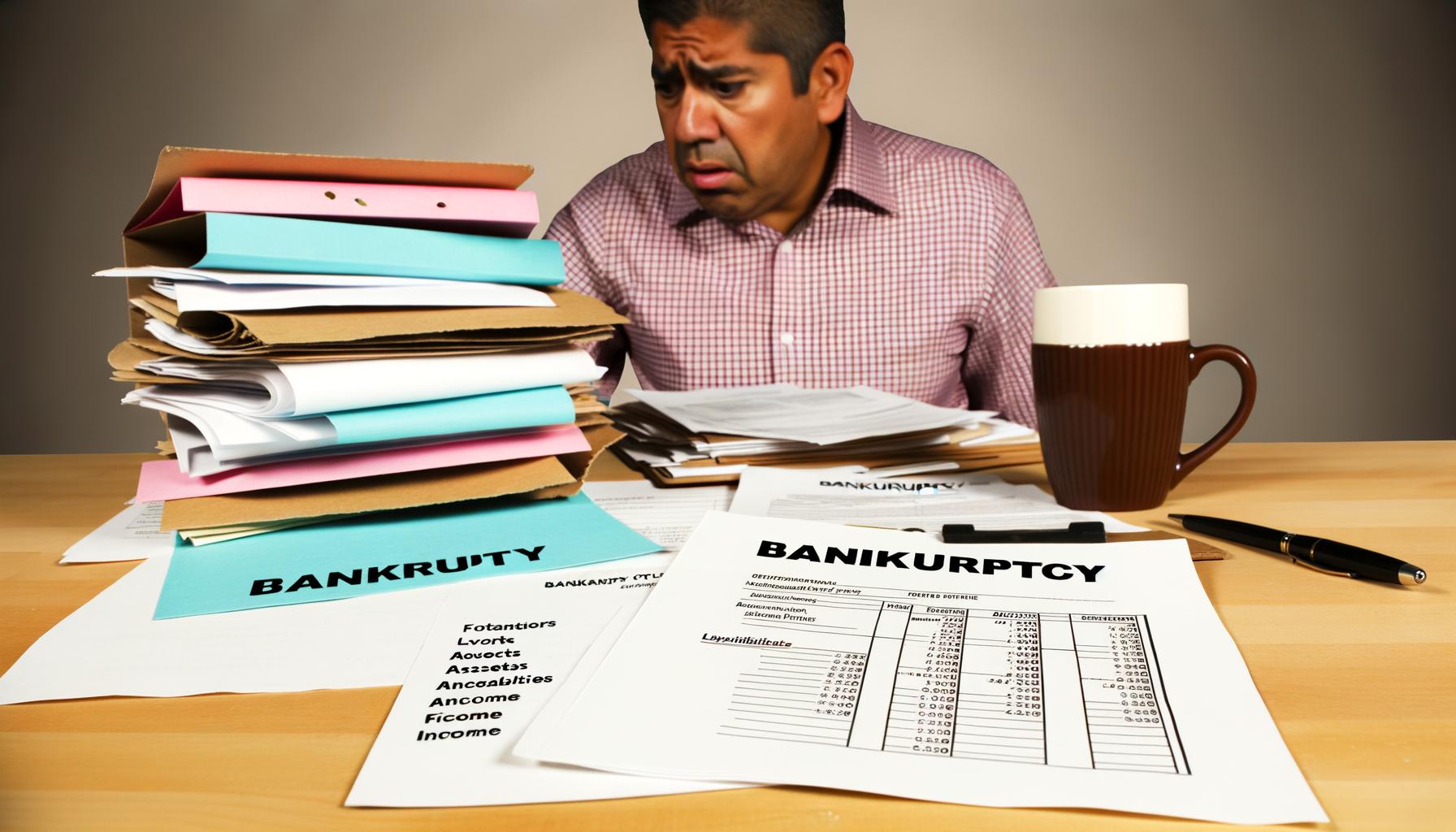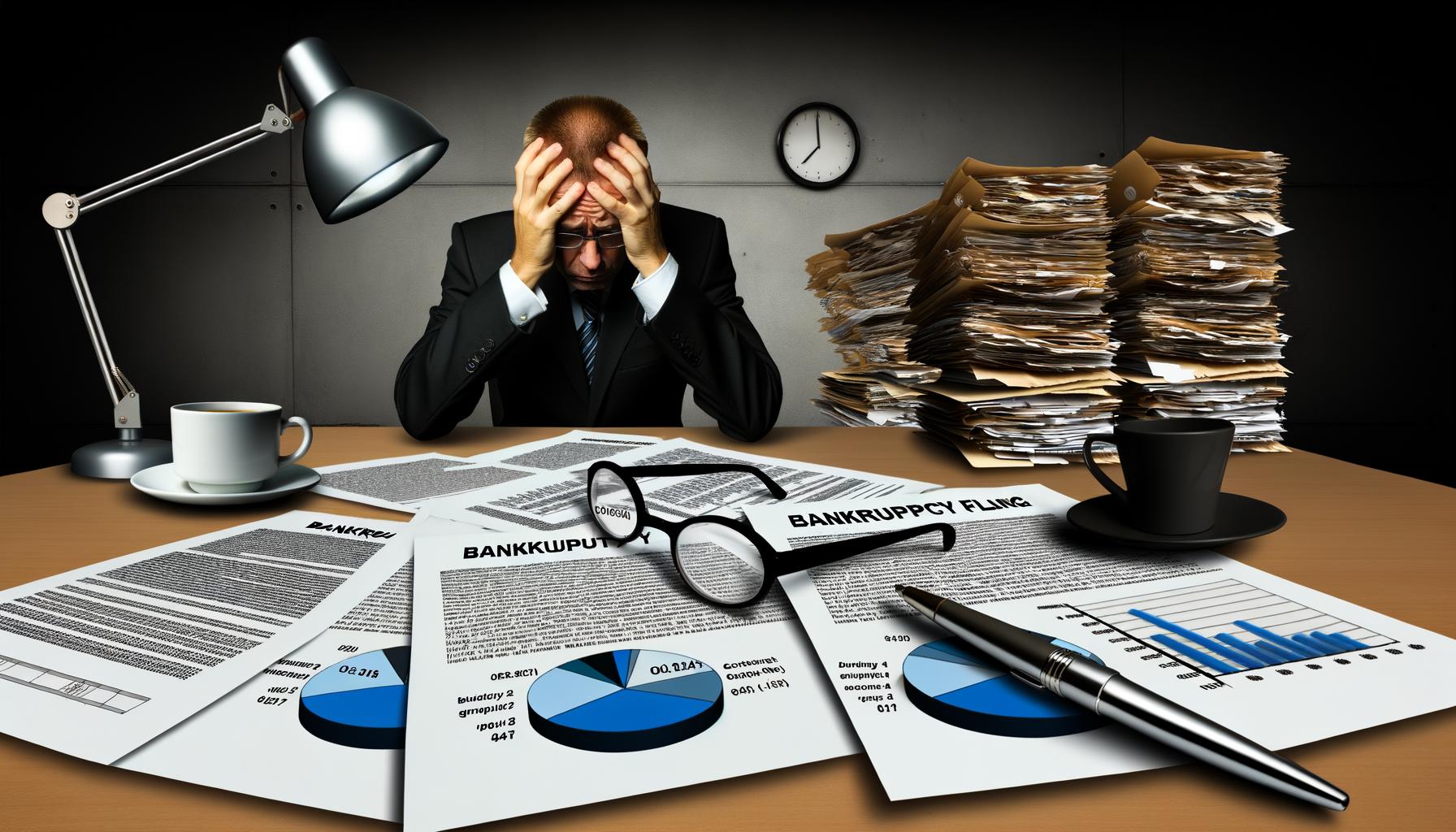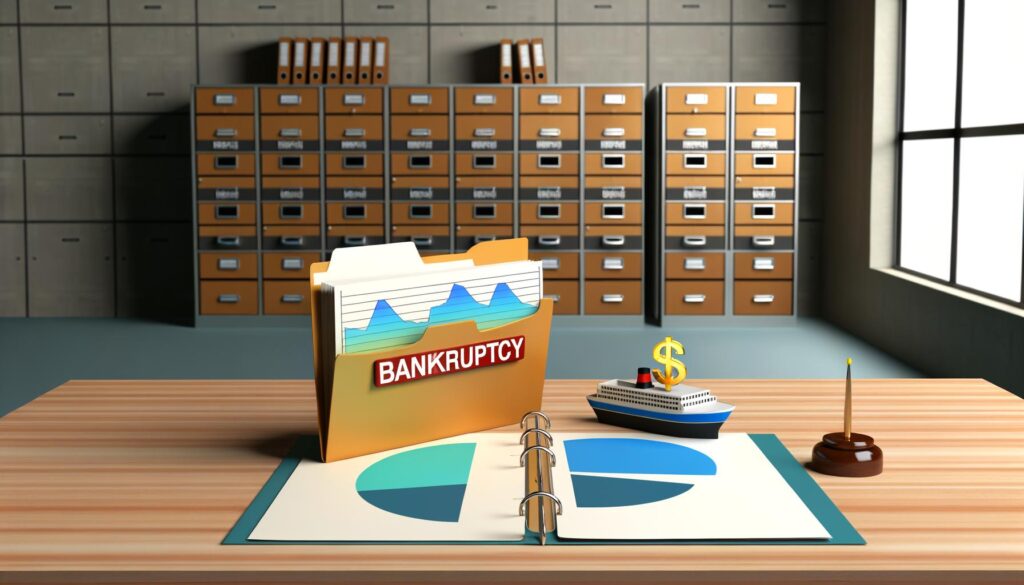Navigating the financial complexities of bankruptcy filing can be daunting, particularly in a community like Newport Beach where residents often face unique economic circumstances. Bankruptcy, a legal process allowing individuals or businesses unable to meet their debts to seek relief, is not just about liquidating assets or setting up repayment plans; it’s also about gaining a thorough understanding of one’s financial standing and exploring all available options.
With its affluent population and high cost of living, Newport Beach presents distinct challenges that make grasping the ins and outs of bankruptcy more crucial than ever.
Bankruptcy filings are influenced by numerous factors including local economic conditions and personal financial habits. Given that Newport Beach houses a mix of wealthy individuals, entrepreneurs, and middle-class families, it’s essential to consider how these diverse economic statuses intersect with the complex California bankruptcy laws.
For residents here, dipping into retirement accounts or failing to service large mortgages can quickly spiral into unmanageable debt situations. Therefore, comprehending the tailored steps required for effective bankruptcy filing in this locale provides an invaluable safety net.
Understanding the importance of the bankruptcy process extends beyond merely recognizing when one might need to file. It’s vital to educate oneself on each step involved-from preliminary evaluations and documentation gathering to post-filing strategies for credit recovery. By demystifying these procedures, individuals can better prepare themselves mentally and financially for what lies ahead. Comprehensive knowledge allows for informed decisions that not only address immediate financial pressures but also pave the way for sound financial recovery long-term.
Understanding Bankruptcy Types
Chapter 7 bankruptcy, often referred to as liquidation bankruptcy, is designed for individuals who truly cannot repay their debts. In a Chapter 7 case, assets that are not exempt by law may be liquidated by a trustee to pay off creditors. This process can provide a fresh start because any remaining unsecured debts are typically discharged once the liquidation and payment process is complete.
Although this might sound straightforward, it’s important to note that not all debts are dischargeable. Child support obligations, certain types of taxes, and student loans usually survive a Chapter 7 filing.
On the other hand, Chapter 13 bankruptcy allows individuals with regular income to develop a plan to repay all or part of their debts over three to five years. Unlike Chapter 7 bankruptcy, Chapter 13 does not require liquidation of assets, which means you get to keep your property. The debtor submits a repayment proposal to the court and makes installments based on disposable income.
At the end of the term, any remaining qualifying debts may be discharged. This form of bankruptcy is thus strategic for those looking to retain their property while systematically managing debt through repayment plans.
Determining whether Chapter 7 or Chapter 13 is right for you involves an in-depth analysis of your financial situation and goals. Factors such as your monthly income, total assets, and types of debt will sway your decision one way or another.
For example, if your income exceeds the median level in Newport Beach and you have substantial disposable income after paying essential expenses, you might be required to file under Chapter 13 rather than Chapter 7 due to eligibility standards under the means test-a calculation determined by federal guidelines.
| Bankruptcy Type | Characteristics | Ideal Candidate |
|---|---|---|
| Chapter 7 | Liquidation of non-exempt assets; discharge after asset sale. | Individuals who can’t repay their debts; lower-income debtors. |
| Chapter 13 | Repayment plan over three to five years; retain property. | Individuals with regular income who want to keep their assets. |
Deciding between these two forms can impact how quickly you recover financially from a bankruptcy filing and how much of your current possessions you’ll be able to keep or sell off in order to meet financial obligations.

Initial Steps in the Bankruptcy Filing Process
Assessing Your Financial Situation: Do You Really Need to File?
Before diving into a bankruptcy filing, it’s crucial to take a step back and critically assess your financial situation. Compile a comprehensive list of all your debts, assets, income sources, and monthly expenses.
This will give you a clear picture of whether filing for bankruptcy is truly necessary or if there are alternative routes to tackle your financial issues. Sometimes debt consolidation or negotiating directly with creditors can be sufficient solutions without going through the legal complexities that bankruptcy involves.
Gathering Necessary Documents: Financial Records, Debts, Assets
Should you decide that bankruptcy is the best course of action, the next step is gathering essential documents. This includes all financial records like pay stubs, tax returns for at least the past two years, bank statements, and documentation of any debts and assets you possess.
Properly organizing these documents is critical because inaccuracies or missing information can lead to delays or complications in your case. Meticulous preparation at this stage ensures that your bankruptcy filing will proceed smoothly once it moves forward in Newport Beach’s legal system.
Completing Credit Counseling: Mandatory Pre-Filing Requirement
One often-overlooked yet mandatory requirement is completing credit counseling from an approved agency within six months before filing for bankruptcy. This session aims to provide potential filers with alternatives to insolvency while also educating them on managing their finances better in the future. The certificate obtained from this counseling must be submitted along with your bankruptcy petition. Skipping this essential step could result in immediate dismissal of your case by the court in Newport Beach.
By carefully assessing your finances, organizing critical documents, and completing required credit counseling sessions, you’ll set a solid groundwork for a more manageable and straightforward bankruptcy process ahead.
Filing for Bankruptcy in Newport Beach
Choosing a reputable bankruptcy attorney in Newport Beach is a critical first step in the legal procedures. Given the complexity of bankruptcy law, retaining experienced legal counsel can provide clarity and ensure compliance with all necessary filings. Look for attorneys who specialize in bankruptcy cases and have robust knowledge of both Chapter 7 and Chapter 13 bankruptcies. Recommendations from friends, online reviews, and consultations can help identify a reliable professional suited to your specific needs.
Once you’ve secured legal representation, the next step involves filing the bankruptcy petition. This petition is comprehensive and requires detailed information about your financial status, including assets, debts, income, and expenses. Essential forms include Schedules A/B (real property and personal property), Schedule C (property you claim as exempt), Schedule D (secured creditors), Schedule E/F (unsecured claims), among others. Accuracy is paramount because any discrepancies may result in delays or complications with your case.

The role of the bankruptcy trustee cannot be overstated. Appointed by the court, this individual reviews your filed documents for completeness and accuracy. They also facilitate meetings with creditors known as 341 meetings, which are pivotal checkpoints in the process. At these meetings, you’ll be required to answer questions under oath about your financial situation. Constructive collaboration with your trustee helps expedite proceedings and minimizes any potential disputes over asset liquidation or repayment plans.
| Key Steps | Description |
|---|---|
| Choosing an Attorney | Seek specialized bankruptcy lawyers with strong reputations. |
| Filing Petition | Submit comprehensive forms detailing all financial aspects. |
| Bankruptcy Trustee Role | Appointed by court to review documents and conduct creditor meetings. |
The Impact of Bankruptcy on Your Life and Credit
Immediate Effects: Automatic Stay and Protection From Creditors
One of the most immediate and significant impacts of a bankruptcy filing is the automatic stay. This legal provision halts all collection activities, including phone calls, wage garnishments, foreclosures, and lawsuits against you.
The relief provided by the automatic stay can offer a much-needed break for individuals feeling overwhelmed by persistent creditors. However, it’s important to note that while the automatic stay is in effect from the moment you file your petition, certain actions such as foreclosure on an active mortgage may only be temporarily paused.
Long-Term Impacts on Your Credit Score and Financial Opportunities
The long-term impact of bankruptcy on your credit score is another critical consideration. A Chapter 7 bankruptcy remains on your credit report for ten years, while a Chapter 13 stays for seven years. This can significantly affect your ability to secure loans, get favorable interest rates, or even apply for rental apartments.
Potential employers may also consider your credit history during hiring decisions. Although these consequences might seem daunting, it’s vital to acknowledge that many people who complete their bankruptcy process find themselves in a better position than before they filed.
Strategies for Rebuilding Your Credit Post-Bankruptcy
Rebuilding your credit post-bankruptcy requires strategic planning and disciplined financial behavior. Begin by obtaining a secured credit card to start rebuilding your credit history responsibly; secured cards require a security deposit that acts as collateral but functions like a regular credit card. Consistently paying bills on time is crucial in demonstrating reliability to future creditors.
Additionally, it can be beneficial to obtain copies of your credit reports from major bureaus – Equifax, Experian, and TransUnion – to ensure all debts included in the bankruptcy are accurately reported as discharged. Over time, with careful management and informed financial decisions, you can gradually restore your creditworthiness.
Common Pitfalls and How to Avoid Them
When navigating the complex process of bankruptcy filing, especially in Newport Beach, it’s crucial to be aware of common pitfalls that could potentially derail your efforts. One significant mistake individuals make is failing to understand the means test properly.
The means test determines whether you qualify for Chapter 7 Bankruptcy or if your income level is too high, thereby necessitating a Chapter 13 filing instead. Inaccuracies or omissions on this test can lead to denied claims and further financial complications.
Misreporting assets and liabilities is another critical area where mistakes are often made. Accuracy in reporting all financial information-including debts, income, and assets-is paramount. Incomplete or incorrect information can result in your case being dismissed or even allegations of fraud. It’s advisable to double-check every document and consult with your bankruptcy attorney to ensure everything is accurately reported.

To stay compliant with court requirements during your bankruptcy process, consider these essential tips:
- Maintain regular communication with your attorney.
- Attend all mandatory court meetings and hearings.
- Adhere strictly to deadlines for submissions of documents.
By following these guidelines, you minimize risks and help streamline the bankruptcy filing process. Employing diligence when gathering necessary documentation and attentively following legal guidance will aid in avoiding these common pitfalls, ultimately paving the way toward successful financial rehabilitation.
Local Resources for Bankruptcy Assistance in Newport Beach
Navigating the complexities of a bankruptcy filing can be daunting, but Newport Beach offers a wealth of local resources to help you through every step of the process. One valuable resource is legal aid organizations that specialize in bankruptcy cases. These organizations provide free or low-cost legal advice and representation to individuals who cannot afford private attorneys. Some well-known options include:
- Legal Aid Society of Orange County
- Public Law Center (PLC)
- Community Legal Services SoCal
In addition to legal aid, various community-based programs offer financial counseling and education, which can be crucial as you rebuild your financial life post-bankruptcy. Nonprofit agencies like Consumer Credit Counseling Services provide workshops and individual sessions to teach budgeting skills, debt management, and credit repair strategies. They often have seasoned counselors well-versed in Newport Beach’s unique economic landscape.
Lastly, it’s essential to know how to contact the Newport Beach bankruptcy court, as this will be where you’ll file your petition and attend necessary hearings. The court’s website usually lists all essential information such as office hours, required forms, and procedural guides specifically tailored for those navigating bankruptcy. By leveraging these local resources effectively, you can simplify the bankruptcy filing process and take significant steps towards regaining your financial stability.
Conclusion
Navigating the complexities of bankruptcy filing in Newport Beach may seem daunting, but understanding each step and knowing when to seek professional guidance can significantly ease the journey. From grasping the differences between Chapter 7 and Chapter 13 bankruptcies to carefully following the initial steps like financial assessment and mandatory credit counseling, being well-informed is crucial for anyone considering this path.
Additionally, recognizing the importance of selecting a reputable bankruptcy attorney and knowing how to efficiently work with a bankruptcy trustee can lead to smoother proceedings.
Importantly, while filing for bankruptcy might offer immediate relief through an automatic stay from creditors, it also brings long-term consequences that need careful attention. It’s vital to be prepared for the impact on your credit score and adjust your financial strategies accordingly to rebuild your financial health post-bankruptcy. Utilizing local resources in Newport Beach – from legal aid organizations to community support services – can provide both guidance and education as you work towards restoring your financial stability.
Ultimately, taking that first step towards filing for bankruptcy should be seen as a proactive measure on the path to regaining financial freedom rather than a last resort. With careful planning and by tapping into available resources, you can navigate through this challenging period more effectively.
Remember that seeking out professional advice is not only recommended but often essential in ensuring all aspects are covered comprehensively. Bankruptcy filing is just one step in your financial journey, and with intentional effort, you can move forward toward a more secure economic future.

